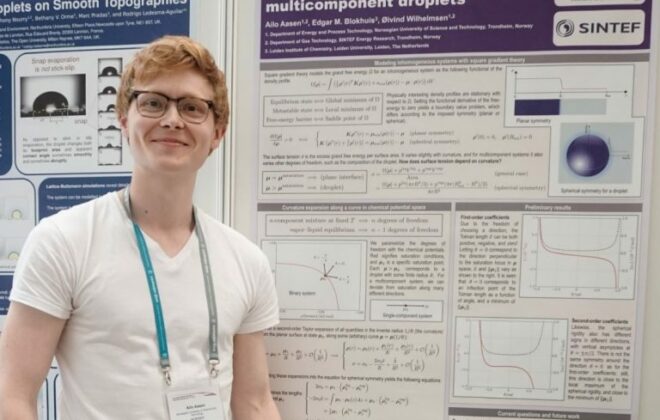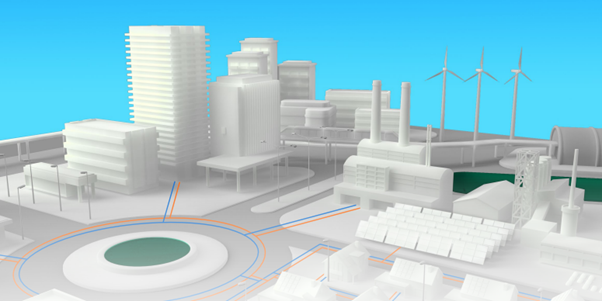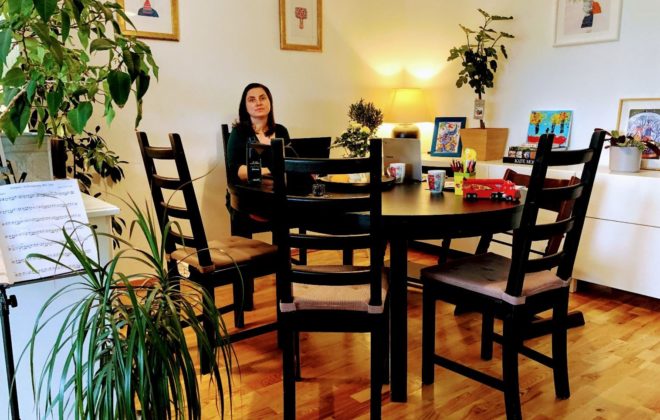Towards higher energy efficiency in the power and process industry

When you are boiling water for your coffee in the morning, you are observing how energy is wasted. Water is boiling at 100oC, but the surface of the kettle might be about 150oC. This waste of energy is because the heat transfer from the wall to the liquid is not an efficient process. Unfortunately, this problem is affecting us daily.
Energy is produced in power plants by boiling water, and part of the energy is wasted due to this inefficient heat transfer. The same is occurring in your refrigerator or in an air-conditioning system. A more complex issue affecting the efficiency of boiling systems is the occurrence of flow oscillations. This means variation in time of the velocity of the flow due to a phenomenon called two-phase flow instabilities.
Under given conditions, the flow can show oscillations, because the velocity increases and decreases in time spontaneously, see Figure 1. This phenomenon has been observed and studied since the 50’s as power plants all over the world were constructed.
The occurrence of these oscillations has been attributed to seriously affect the efficient heat transfer in addition to the potential damage of the equipment. For this reason, the operation of the plant can be restrictive by the occurrence of these oscillations. However, when, how and why the oscillations are damaging to the heat transfer process are questions that have puzzled the research community for several decades.

Click here to see a video of density wave oscillation.

The two-phase flow instability laboratory at our group allows us to revisit this old question by performing a well-controlled experimental study. Our recent results show that flow oscillations are damaging to the heat transfer coefficient but only if the amplitude of the oscillations are above a given value, see figure 2.
This new result suggests that the well-established assumption that flow oscillations can affect the heat transfer process need to be reconsidered.

The details of the study are available in this publication: Applied Physics Letters, 113, 154102 (2018)
Blog post originally published on www.ntnutechzone.no on October 19th, 2018

Il Woong Park
Il Woong Park is a PhD candidate Department of Energy and Process Engineering, NTNU, belonging to the Thermal Two-Phase Flow Laboratory.

Joengrim Ryu
Jeongrim Ryu is a PhD candidate Department of Energy and Process Engineering, NTNU, belonging to the Thermal Two-Phase Flow Laboratory.
Search
Søk
Categories
- Arctic Research
- Arkitektur
- Bærekraft
- Bioingeniørfag
- Biologi
- Biology
- Biomedical Laboratory Science
- Biotechnology
- Bioteknologi
- Chemical Engineering
- Chemistry
- Climate
- Computer Science
- Datateknologi
- Digital
- Elektronikk
- Energi
- Energi
- Energy
- Engineering
- Engineering
- Environment
- Food Science
- Forskning
- Fysikk
- Fysikk
- Havbruk
- Informasjonsteknologi
- Informasjonsteknologi
- Ingeniørvitenskap
- Kjemi
- Kjemisk prosessteknologi
- Kjemisk prosessteknologi
- Kreftbehandling
- Kybernetikk
- Marine Technology
- Materialer
- Materials Science
- Materialteknologi
- Matvitenskap
- Meninger
- Miljø
- Min ph.d.
- My PhD
- My PhD
- My postdoc
- Nanotechnology
- Nanoteknologi
- Ocean
- Oil and gas
- Physics
- Research
- Simulering og visualisering
- Spør en forsker
- Studentliv
- Sustainability
- Ukategorisert
- Universitetsliv
- University Life
Kategorier
- Arctic Research
- Arkitektur
- Bærekraft
- Bioingeniørfag
- Biologi
- Biology
- Biomedical Laboratory Science
- Biotechnology
- Bioteknologi
- Chemical Engineering
- Chemistry
- Climate
- Computer Science
- Datateknologi
- Digital
- Elektronikk
- Energi
- Energi
- Energy
- Engineering
- Engineering
- Environment
- Food Science
- Forskning
- Fysikk
- Fysikk
- Havbruk
- Informasjonsteknologi
- Informasjonsteknologi
- Ingeniørvitenskap
- Kjemi
- Kjemisk prosessteknologi
- Kjemisk prosessteknologi
- Kreftbehandling
- Kybernetikk
- Marine Technology
- Materialer
- Materials Science
- Materialteknologi
- Matvitenskap
- Meninger
- Miljø
- Min ph.d.
- My PhD
- My PhD
- My postdoc
- Nanotechnology
- Nanoteknologi
- Ocean
- Oil and gas
- Physics
- Research
- Simulering og visualisering
- Spør en forsker
- Studentliv
- Sustainability
- Ukategorisert
- Universitetsliv
- University Life



